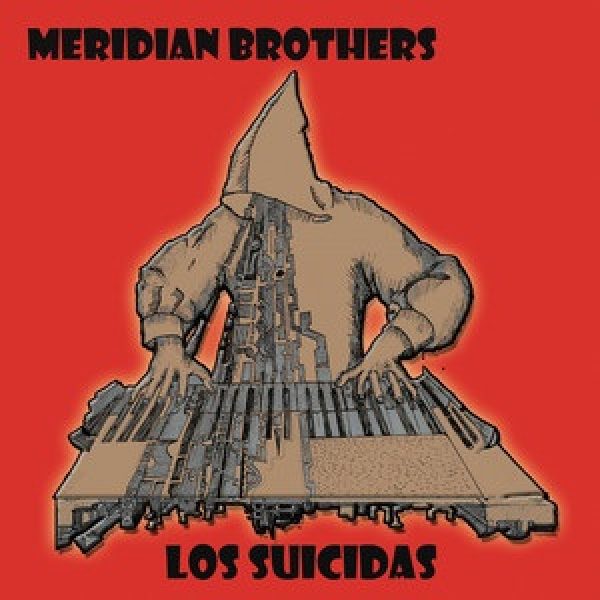Eblis Alvarez is the creator and driving force of Colombia’s alternative music phenomena, the Meridian Brothers. Starting as a classical guitarist, Alvarez has become a leading musician and producer in Bogotá’s underground music scene. Meridian Brothers have released 10 albums and EPs since 2011. The early music was highly electronic, but has evolved in a more acoustic direction, culminating in an all acoustic album delving into Colombia’s homegrown take on salsa dura, hard salsa! 2022’s album Meridian Brothers & El Grupo Renaciamento (The Renaissance Band), is an engaging nine-track romp evoking classic Colombian salsa, but with a difference.
Afropop’s Banning Eyre reached Alvarez shortly after a historic election as the next president of Colombia on June 19, 2022. Further history was made as Petro’s new vice president Francia Márquez is an Afro-Colombian woman—another first. Alvarez was thrilled with this result, and very hopeful that it represents a true turning point in Colombian politics and governance. Time will tell about that, but meanwhile, the conversation focused on the Meridian Brothers and this fascinating new release.
Banning Eyre: Nice to meet you. Why don't you start by introducing yourself?
Eblis Alvarez: O.K., I am a musician from Bogotá, and I founded the Meridian Brothers and some other bands in the local underground scene.
Where did the name Meridian Brothers come from?
Well, the name actually came by chance. It was a teenager's name. It was an old quartet I had in university with good friends of mine. The Meridians were four classical guitarists. And then I kept the name for my own personal project, the Meridian Brothers, which I started when I was around 20 or 21 years old.
So you started out as a guitarist.
Yes. I am a classical guitarist and I played jazz music also, and some rock. I’m a string guy.
As a fellow guitarist, I get it. Aside from performing and recording, you produce artists, don't you?
Yes. I am currently producing and mixing. I work a lot in the studio, mastering different records. I do restorations of old recordings. I also mix and produce other bands.
Let’s talk about Meridian Brothers. What was the concept in the beginning?
It was a lot of stuff in the beginning, but basically it was my personal project. I didn't even want to put it out publicly. That sort of just happened. I was experimenting with sounds, harmonies, timbres. It became something that worked with the subconscious collective mind in music mainly in Latin America. It's a very long journey. It's been 25 years of doing this stuff.
I know that your early music was a lot more electronic than this album.
Yes, this one is totally acoustic.
And very much focused on salsa music. How did that idea come about?
Salsa has been like a backbone of the style of the Meridian Brothers since about 10 years ago. I got particularly interested in the very popular styles of Colombia, which are basically accordion music, cumbia, vallenato and salsa music. Cumbia and vallenato have particular places in society, and salsa has its own place. It's more like working-class urban music. You can find salsa clubs in every neighborhood in Bogotá. And salsa dancing: even though it's very complicated, people are very expert at dancing salsa in Bogotá and other big cities. So I got interested in this collective unconscious mind of the people around salsa.
Salsa has its idols, really huge idols. Vallenato also has its idols. So I got interested in these very popular streams of music. I concentrated myself to record it properly, to play it properly, to learn the style. It took me a few years to get to this point. When I released El Grupo Renacimiento I felt ready to produce real salsa, because before I used to play with the style in a very experimental fashion. But this album is the first attempt to do a traditional salsa record that will actually blend with older, traditional salsa records. I did this with my previous album about vallenato, Paz en la Tierra. So I have addressed these two very popular styles on the last two albums.
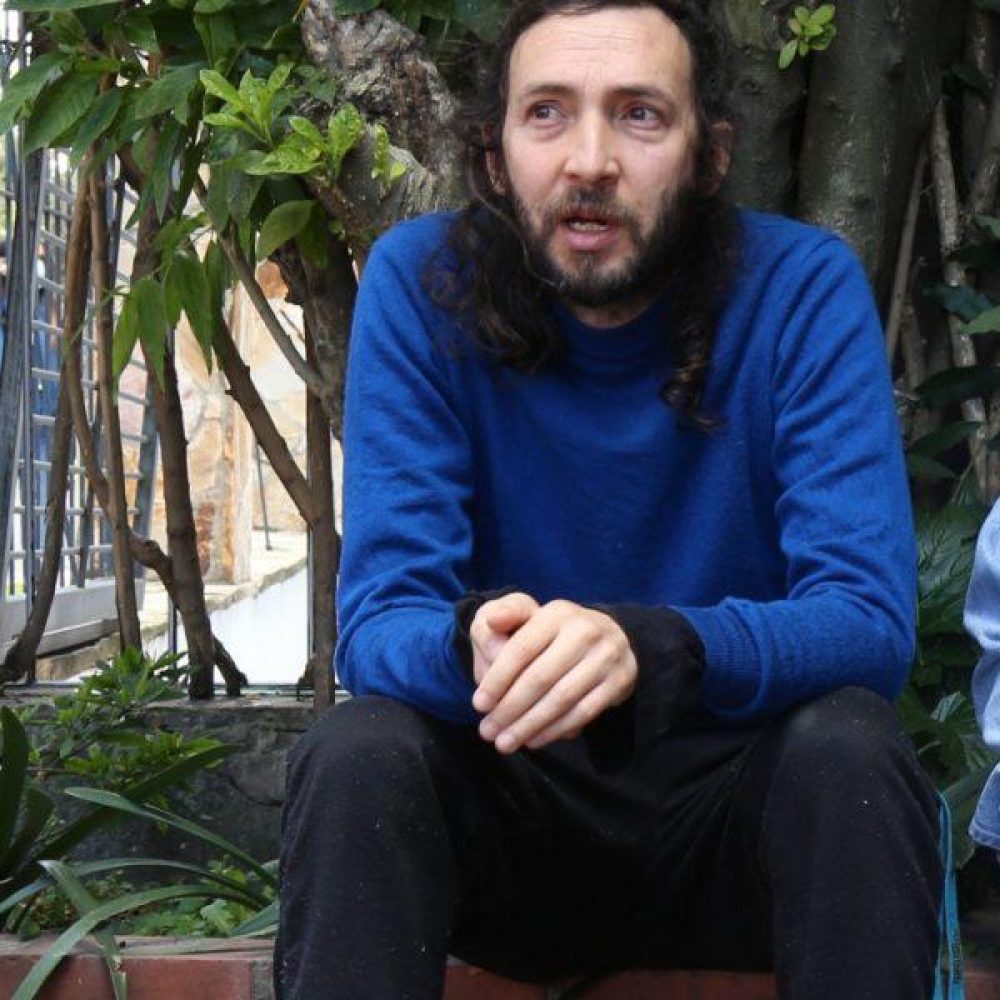
Fantastic. Let's talk about some of the songs. Educate us a bit on how you put these salsas together.
Well, the basic format comes from an inspiration I got from Joe Cuba. Joe Cuba made a really risky experiment in the ‘60s. He was playing vibraphone within the salsa format, which is usually percussion, bass and piano. This was something risky because the normal format used woodwind instruments, and he had all the weight of the tradition, the sonora and jazz bands. So this was a risky thing. People thought that the sound wouldn't be respected enough to have success in Latin music. So I took that example and put it into my experience, because I am a guitarist, and salsa has brass all over the place. It's always brass bands, so if Joe Cuba took this risk, I decided to take this risk using just the guitar and the piano in the traditional format: guitar, piano and nothing else. Another thing I took inspiration from is actually highlife and soukous music, and the West African approach to salsa and Cuban music.
Yes. I really noticed that on the song “Descarga Profetica.” It first reminded me of Haitian compas, but I can hear the West African connection.
Yes. This is the most African song on the record.
Tell me about the opening song, “La Policia.” It's a beautiful salsa, but I’m curious to know what inspired the lyrics and the title.
Well, actually it has to do a lot with the political turmoil that we have been through for the last nearly 10 years. It came out especially in a very critical moment of the protests in Colombia. There was a huge scandal how police treated people during the protests of 2019. A lot of young people were killed or injured. People were unfairly kicked very badly. It was very nasty behavior that the police engaged in. So this song is a product about that. I saw videos of the police going into poor people's houses, breaking glasses. Innocent people, even people who were not protesting at all. So out of my rage about that, I composed this song, pointing out just how nasty the police are with people.
Let's hope the new politics bring some changes in that department. We'll have to wait and see.
Yes. We will wait for the facts.
Let's talk about the song "Metamorphosis." I love the video for this song, which is essentially a tour or through the beautiful cover art for this album.
Yes that’s the cover of the album. Most of the subjects for Grupo Renaciemiento have an inspiration—as on my last album—that comes from digging into a particular cultural part of Colombia’s musical collectivity, but through my own musical individuality. Grupo Renaciemiento has this attitude that comes from the 1970s. There is a sadness about the political situation after the Flower Power renaissance that was actually killed by the war, the threat of nuclear bombs, this disillusionment of the 1970s after the boom of economics in the ‘50s in the United States.
Salsa is basically a genre that was born in the United States and then imported to Latin America, where it took on this identity as a Latin music. So basically, Grupo Renaciemiento moves between social sadness and criticism of the system. Metamorphosis is an extrapolation of this ‘70s attitude into the present. This song talks about how we are going to turn into robots through trans-humanism. We will merge technology and humans. So basically these old guys are complaining about this. "Oh, we don't want to get turned into robots by trans-humanism.” So “Metamorphosis" is the transformation from human into trans-human.
Interesting. Who did that cover art? It's really beautiful.
Glenda Torrado. She is a fantastic Colombian artist who lives in Mexico. I worked with her on the album I made in 2020 called Cumbia Siglo XXI. She did that art, and I decided to work with her again because she's such a genius. We started by discussing art that would show El Grupo Renasiemiento playing a concert on a sunny day, playing a concert for people who are relaxing and having fun.
How about the song “Bomba Atomica.”
Well, Grupo Renasiemiento goes back to the ’70s, with the fear of the atomic bomb. So it’s about that, but it's also got a double meeting because bomba is the Puerto Rican rhythm that they are playing. Basically, in this song, it's like these teenage salsa musicians from the ’70s with their fear of the atomic bomb. Grupo Renasiemiento have a lot of historical points they refer to, and those points create a kind of a fantasy. So they're thinking about the atomic bomb, and saying, "Oh no, this is also a problem for Bogotá people." So it's like a fantasy that becomes reality through the music.
I see. It's part of the lore of this imaginary band. This album digs into salsa, and the last one into vallenato. Was Cumbia Siglo XXI about cumbia? Can we think of these three as a kind of trilogy of traditional Colombian styles?
Kind of. In this past decade I've been making thematic albums that focus on particular parts of Latin culture. So the album Cumbia Siglo XXI is focused on a particular style from Barranquilla, and the album name is the name of a famous cumbia group. The previous album, Paz en la Tierra (2021), was made with a very good vallenato group here in Bogotá called Conjunto Media Luna, and the accordionist Iván Medellín. I wanted to really put a traditional vallenato album out, and now this one is salsa. So it's like a trilogy of albums based on particular concrete styles of Colombian music.
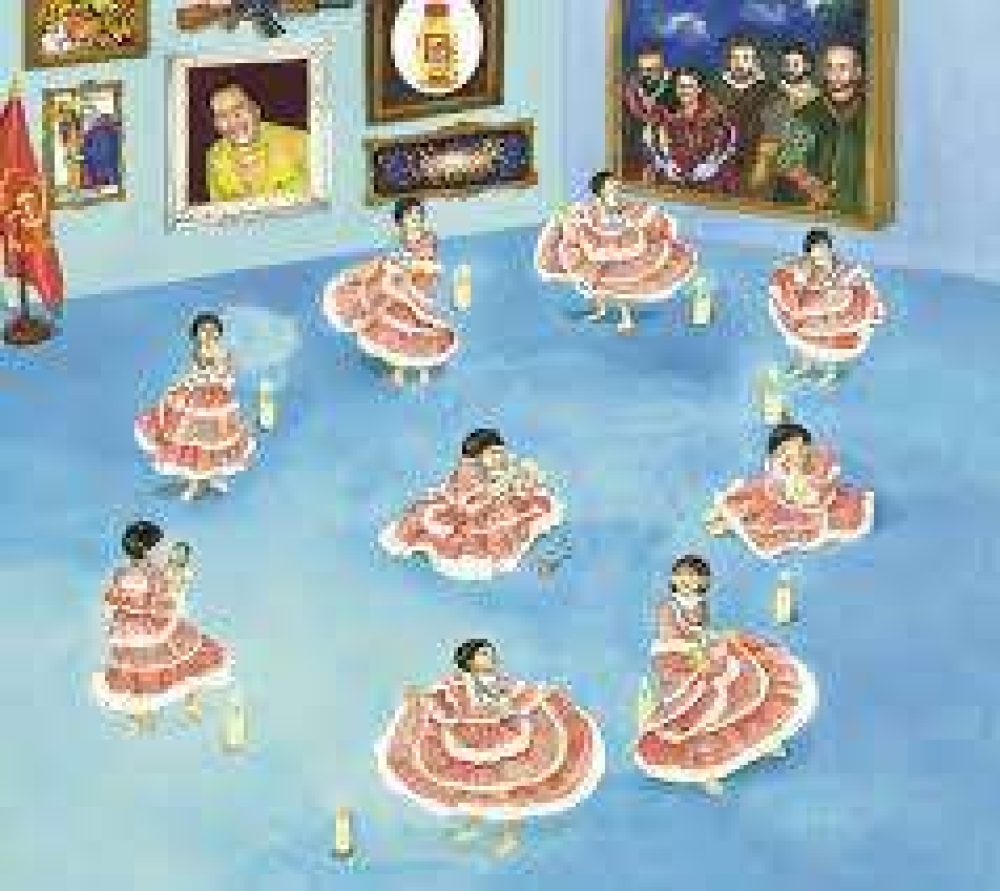
Beautiful. I see you are going to be touring in August and September. Tell me about what kind of a group you take on the road with you.
We are five pieces and a sound engineer. So we have been—and we have to be—very versatile to put all these styles out live. We've managed to get five musicians to do all these numbers, but then, we also have to play our own music, which is more electronic. So we have all kinds of electronics gadgets and samples and sequencers in order to transform ourselves to present the intentions of the different albums. On this tour, we are going to perform songs from Cumbia Siglo XXI as well as some very, very old songs that have been successful, songs that people really dig. And we will manage to do the salsa thing. It has been really difficult.
It's also difficult because I have to change my voice into the Grupo Renacimiento voice. It is transformed with the computer. I don't have such a really deep voice. I'm not that big a guy. So I have to transform my voice with the computer. That's what I did in the studio also. So it's almost like changing personalities for each song. It's kind of tricky. But we hope to succeed with that.
That does sound challenging, but I bet it’s a great show. For folks who are still a bit in the dark, I think you should tell us more about the history of Grupo Renaciemiento.
It's kind of ambiguous, and I want to keep it that way, keep it open. It requires a little quantic thinking about El Grupo Renacimiento. We invented a story behind this group. It's fake news. But, since people have such short memories about stories and everything, some people will think it's true. Some people will think it's false. I always say it's a false/true group. It's a history that we invented. I created a documentary with my friend Mateo Rivano, who I've been working with over the years on album art and videos and everything. The documentary tells the story of El Grupo Renacimiento as told by the group’s lead singer.
Give me some highlights.
This story is about me, Eblis Alvarez the producer, passing by a church and then I find these fantastic musicians from the past, from the ‘70s, and I record them and put out an album of them. It's a sort of a Buena Vista Social Club fantasy, but just in fantasy and in the cloud. It's something that goes into the world of information and big data. There are true and fake stories. We don't know. That's why I say El Grupo Renacimiento is a false/true story. But right now, we have such short memories that some people will think, “Oh yeah, Grupo Renacimiento, those guys from the ‘70s from Bogotá. I remember.” So this is a whole documentary, and my friend Matteo created animation for it. It will be online very soon.
I love it. Reminds me of 3 Mustaphas 3, a fictional Balkan band created back in the ‘80s. Also great musicians, by the way.
Well, it's not a new idea. It's something that's happening a lot in this world of information. We get everything from the screen. We get our whole reality from a screen, so why not make it up? It's a novel. It's a tale. But the music is all by the Meridian Brothers, my live band, which I played with in the studio. But then there’s also the story behind it.
Are there any other songs you might want to tell us about in terms of the message?
The general message is that I tried to impersonate a teenager ghetto group. I call it Class B salsa, the rejected ones, the ones that weren't signed by Fania Records, the ones that were sidelined by the mainstream of salsa. So most of the songs talk about that. The first one talks about the police. The second one, “Poema del Salsero Resentido,” talks about how everything is being sampled. It talks about the electronic music and electronic cumbia. They don't like it. They want the real stuff. “Metamorphosis” talks about trans-humanism. This one is composed in the 21st century.
Then the fourth one, “Bomba Atomica” is supposed to be composed in the ‘70s. But everything is false. “Trista Son” is about pure sadness. “Hermana Necesito” is about vices and addictions. Because El Grupo Renascimiento fell into drugs and then they were recovered because of church. They became Christians. They got faith and got born again.
“Descarga Profetica” has the least clear message. It's a kind of jibber-jabber message. Then we get the last two songs. “Hypnosis” is about hypnosis, of course. And the last song “La Mujer Sin Corazon” is a cover from the Puerto Rican singer La Calandria.
It's a terrific record. Have a great tour, and good luck with your new government. Thanks for talking with me. It was a pleasure.
Thanks a lot.
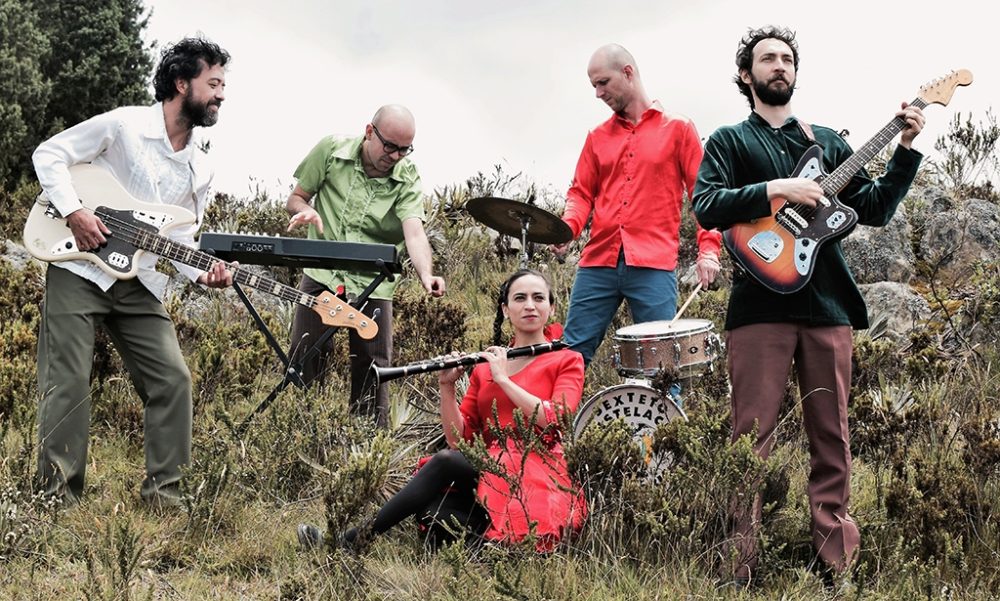
Related Audio Programs
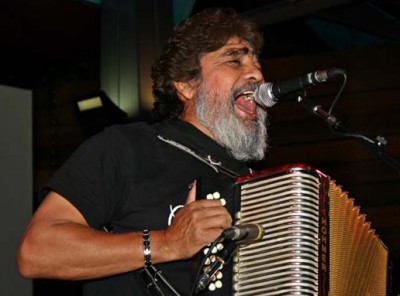
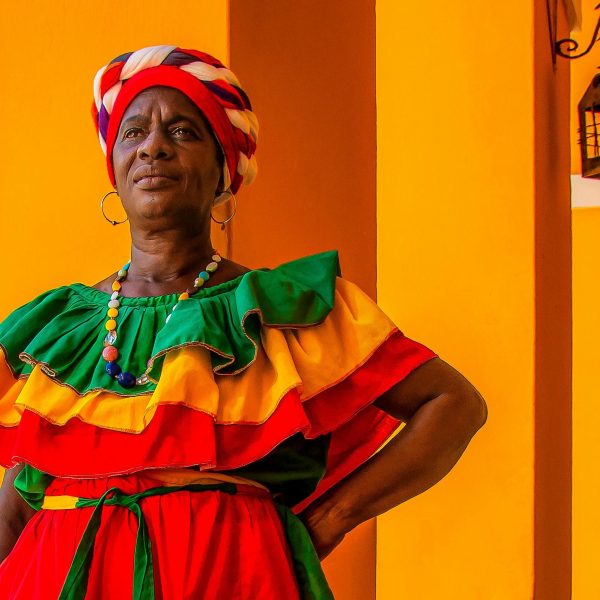
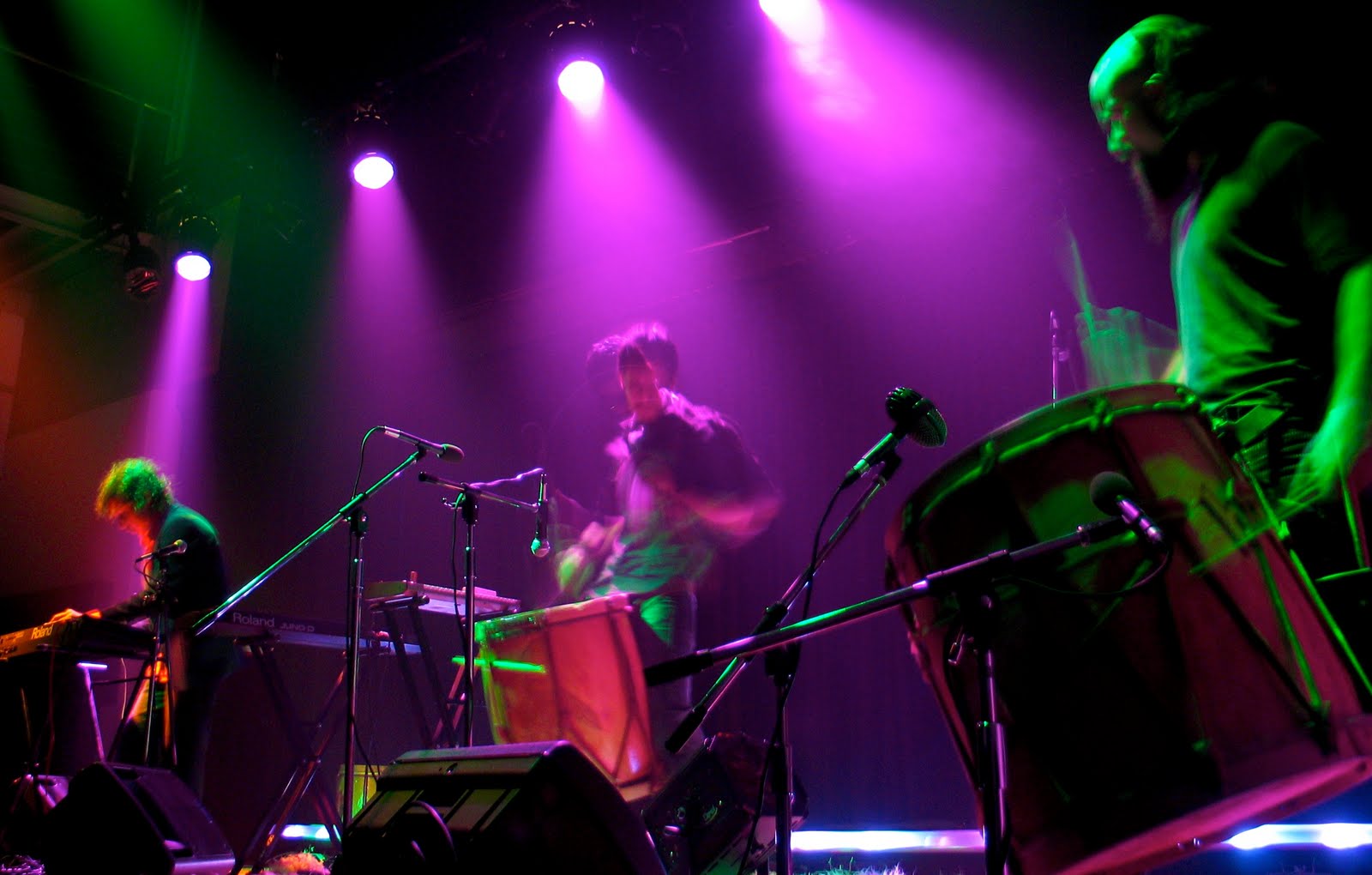
Related Articles
